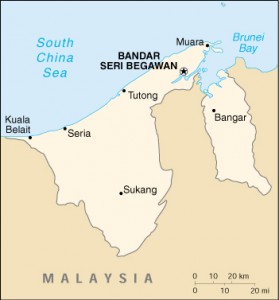Children of Brunei
Realizing Children’s Rights in Brunei


The small country of Brunei has made lots of progress regarding children and the principles spelled out in the Convention on the Rights of the Child. However, it must follow through, because although minors make up more than a third of the population, some of their rights are still not guaranteed under the law. Some cruel cultural practices also still exist, including corporal punishments, which are allowed both in the home and in schools.
Population: 415.700 Life expectancy: 78.6 years |
Main problems faced by children in Brunei:
 School attendance was not mandatory until the 2000’s. Since then, however, free and universal education has become mandatory for the first nine years of schooling. After that, it continues to be free, but not legally mandated. Also, academic fees for non-citizen permanent residents have been eliminated.
School attendance was not mandatory until the 2000’s. Since then, however, free and universal education has become mandatory for the first nine years of schooling. After that, it continues to be free, but not legally mandated. Also, academic fees for non-citizen permanent residents have been eliminated.
About 93% of the country’s children attend school, a very high amount. The literacy rate is equally high, above 90%.
School courses in Islam, the dominant religion, or in national ideology are required. In addition, it is forbidden to teach any other religions.
Brunei’s health care continues to be in good shape, as medical services are provided free of charge to citizens and permanent residents.
The infant mortality rate has dropped considerably, and over 95% of children are vaccinated, helping to free Brunei of all transmissible diseases.
Abortion is not allowed in Brunei, however, and more efforts need to be made to expand education concerning pharmaceutical birth control and sanitary care.
The age of criminal responsibility in Brunei is much too low: at seven years old, a child is responsible before the law.
There is no appropriate judicial system for children. If condemned, they must serve their sentences in an adult prison, which is a governmental rehabilitation center where it is still common practice for boys to be whipped. In fact, whipping is required for drug-related crimes and criminal offences, and is included in 80% of sentences given.
There is no legal requirement for handicap accessibility or any other assistance for handicapped persons. Reports show that projects to provide educational services to handicapped children do not respect international norms.
Non-discrimination is not included as a principle of the country’s legislation, although discrimination seems to be present throughout the country.
Although 70% of the population is ethnically Malay, the Chinese minority makes up a full 18% of the population. There is also a strong Indian minority present.
Identity cards include an individual’s ethnicity, which can lead to discrimination.



